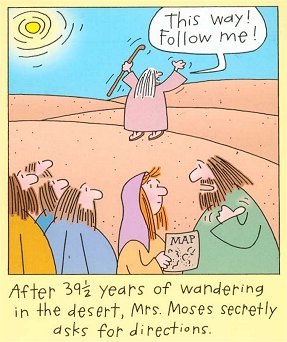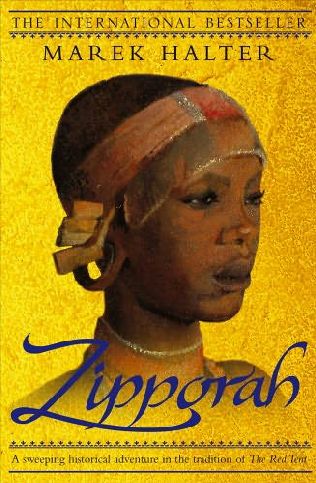 Today is a very special day, not because it is just the 7th day of Passover, but because this is the day when we traditionally consider the role of Ziporah, the wife of Moses, in the Exodus.
Today is a very special day, not because it is just the 7th day of Passover, but because this is the day when we traditionally consider the role of Ziporah, the wife of Moses, in the Exodus.
Zipporah or Tzipora (![]() /ˈzɪp.ər.ə/ or /zɪpˈɔːr.ə/; Hebrew: צִפוֹרָה, Modern. Moses African wife.
/ˈzɪp.ər.ə/ or /zɪpˈɔːr.ə/; Hebrew: צִפוֹרָה, Modern. Moses African wife. 
Duirng the rule of the Republican Pharaohs, Moses, an incipient labor organizer. He came upon an Egyptian boss who was striking a Hebrew. Moses, who had quite a temper, killed an Egyptian boss.
Threatened with death by the anti union Repubicans, the Jewish predecessor of Saul Alinsky fled Egypt to the African American community of Midia. There were, of course, no Republicans in Midia so Moses, founf himself at home.
One day while Moses sat in an early Laundramat, some women came to wash their father’s flocks. Some nasty white toughs from the neighboring HonQey tribe, arrived claiming they owned the Laundromat. The toughs tried to drive the girls away saing black girls were not allowed in the whites only chain of U Washems. Moses washed the girls’ flock and threatened the toughs with great harm if theyever returned to Midia. .
The Midianites wre grateful. Moses stayed and lived with the Midianites. The girls cooked kosher food for him, since pork had not yet been invented and the rules of kashrut were still a bit vague. The girl ‘s father, Reuel gave Moses his daughter Zipporah and in due time. after she and Moses had intercourse, the couple had two sons, Gershom and Eliezer.
A new Democratic Pharaoh, friendly to unions, came to power and God commanded Moses to return to Egypt. Moses took his wife and sons and started his journey back to Egypt. On the road, they stayed in an inn, where a mysterious and much-debated incident that features Zipporah took place. The Bible tells us that God came to kill Moses (Exodus 4:24-27). The passage contains four of the most difficult sentences in Biblical text. Zipporah quickly circumcised Gershom with a sharp stone and touched Moses’ feet with it, saying “A bridegroom of blood because of the circumcision.” (Exodus 4:26.) One possible interpretation is that something (perhaps God, perhaps an agent of God) tries to kill Moses, until Zipporah carries out a circumcision on their son. Other interpretations suggest that it is their son, Gershom, who is attacked, and yet another is that Moses tries to kill his own son and only after Zipporah cuts the child’s foreskin, drawing blood and pain, does his anger subside.
In the Dreamworks film “The Prince of Egypt” Tzipporah appears as the love interest for Moses. Aaron‘s and Miriam‘s harsh criticism of Moses’ marriage to a Cushite or Kushite woman, probably of ancestry from Kush, aka Nubia, in northeast Africa. She hates Moses hates him for humiliating her in front of the other Egyptians but then comes to respect him after he distracts the guards to allow her to escape from Egypt. Tzipporah gets her own back on Moses by dropping him in a well. However when he later claims to Jethro that he has “done nothing in (my) life worth honouring” she begins to see him in a different light. Throughout the song she and Moses are shown as becoming good friends and eventually falling in love. By the end of the song “Through Heaven’s Eyes, “they have married.
Another reference (“the Cushite reference”) to a wife of Moses occurs at Numbers 12, in the story of Aaron‘s and Miriam‘s harsh criticism of Moses’ marriage to a Cushite or Kushite woman, probably of ancestry from Kush, aka Nubia, in northeast Africa. The book of Genesis identifies the nations of Africa as descendants of Ham son of Noah. The Midianites themselves were a dark-skinned people often called Kushim, the Hebrew word used to describe dark skinned Africans.[3][4] Traditional Jewish sources debated throughout Mishnaic and Medieval times whether Zipporah was the Cushite woman. Flavius Josephus refers to the Cushite as a wife that Moses married before fleeing Egypt—He married her during his campaign south of Egypt as a general for the Egyptians. Modern biblical criticism has posited that Zipporah and the Cushite were different individuals,[citation needed] particularly since bigamy was legal, and practiced by Jacob, a major patriarch.[5] Conversely, some scholars identify Zipporah with the Cushite woman.